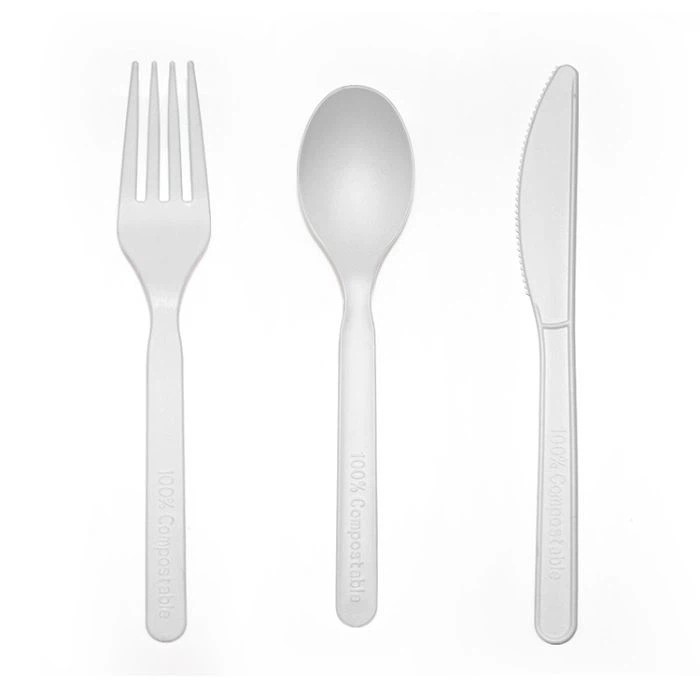Do PLA spoons leach chemicals?
Aug 21, 2025
As a supplier of PLA spoons, one question that frequently comes up in conversations with potential clients and environmentally - conscious consumers is: "Do PLA spoons leach chemicals?" This is a valid concern, especially in an era where food safety and environmental impact are at the forefront of public consciousness. In this blog post, I'll delve into the science behind PLA spoons and address this important question.
What are PLA Spoons?
PLA, or polylactic acid, is a biodegradable thermoplastic derived from renewable resources such as corn starch or sugarcane. It has gained popularity in recent years as an alternative to traditional petroleum - based plastics due to its lower carbon footprint and biodegradability. PLA spoons are made by melting and molding PLA resin into the desired spoon shape. They are commonly used in food service applications, including restaurants, cafes, and take - out joints, as well as for home use.
Chemical Composition of PLA
The basic building block of PLA is lactic acid, which is a natural compound found in many living organisms. During the polymerization process, lactic acid molecules are linked together to form long chains of polylactic acid. This chemical structure gives PLA its plastic - like properties while maintaining its biodegradable nature.
In its pure form, PLA is considered to be a relatively safe material. It has been approved by regulatory agencies such as the U.S. Food and Drug Administration (FDA) for use in food contact applications. This means that, under normal conditions, PLA is not expected to leach harmful chemicals into food.
Factors Affecting Chemical Leaching
However, several factors can potentially influence whether chemicals leach from PLA spoons. These include:


- Temperature: High temperatures can accelerate the degradation of PLA and increase the likelihood of chemical leaching. For example, if a PLA spoon is used to stir a very hot beverage or left in direct sunlight for an extended period, the heat can cause the polymer chains to break down, releasing small amounts of lactic acid and other by - products.
- pH of the Food: The acidity or alkalinity of the food in contact with the PLA spoon can also play a role. Highly acidic or alkaline foods may react with the PLA, leading to chemical changes and potential leaching. For instance, acidic foods like citrus fruits or vinegar - based dressings could potentially have a more significant impact on the integrity of the PLA compared to neutral or slightly alkaline foods.
- Additives and Contaminants: In some cases, manufacturers may add other substances to PLA to improve its performance, such as plasticizers, stabilizers, or colorants. These additives could potentially leach into food if they are not properly formulated or if the PLA spoon is exposed to harsh conditions. Additionally, if the production process is not carefully controlled, there could be contaminants present in the PLA resin that might leach out.
Scientific Studies on Chemical Leaching
Numerous scientific studies have been conducted to investigate the potential for chemical leaching from PLA materials. Overall, the results have been reassuring. Most studies have found that, under normal use conditions, the amount of chemicals leached from PLA spoons is extremely low and well within the safety limits set by regulatory agencies.
For example, a study published in the Journal of Agricultural and Food Chemistry analyzed the migration of chemicals from PLA food containers into different types of food simulants. The researchers found that the levels of lactic acid and other potential leachates were negligible, even after prolonged contact at elevated temperatures.
Another study focused specifically on PLA cutlery. It examined the leaching of chemicals into food under various conditions, including different temperatures and food types. The results showed that, although there was some minor leaching in certain extreme scenarios, the amounts were far below the levels that would pose a risk to human health.
Our Commitment as a Supplier
As a supplier of PLA spoons, we take the issue of chemical leaching very seriously. We source our PLA resin from reputable suppliers who adhere to strict quality control standards. Our manufacturing process is designed to minimize the use of additives and ensure that the final product is free from contaminants.
We also conduct regular testing of our PLA spoons to ensure compliance with food safety regulations. Our products are tested for chemical migration under a variety of conditions, including those that simulate real - world use. This allows us to provide our customers with high - quality, safe PLA spoons that they can trust.
Related Products
In addition to our PLA spoons, we also offer a range of other biodegradable cutlery products. You can check out our Cpla Spoon, which offers similar benefits in terms of biodegradability and food safety. Our Cpla Utensils set includes spoons, forks, and knives, providing a complete solution for your food service needs. And if you're specifically looking for a knife, our PLA Knife is a great option.
Conclusion and Call to Action
In conclusion, while there is a theoretical possibility of chemical leaching from PLA spoons under certain extreme conditions, the scientific evidence suggests that, under normal use, PLA spoons are a safe and environmentally friendly choice for food service. As a supplier, we are committed to providing high - quality products that meet the highest standards of safety and sustainability.
If you're interested in purchasing our PLA spoons or any of our other biodegradable cutlery products, we invite you to contact us for a detailed discussion. Whether you're a restaurant owner, a caterer, or a consumer looking for eco - friendly options for your home, we're here to help you make the right choice. Let's work together to reduce our environmental impact while ensuring the safety of our food.
References
- Journal of Agricultural and Food Chemistry - [Title of relevant study]
- Study on PLA cutlery - [Title of relevant study]
- FDA regulations on food contact materials - [Reference details]
